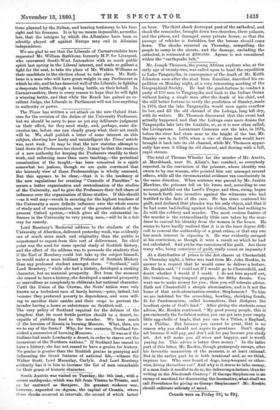The trial of Thomas Wheeler for the murder of Mr.
Anstie, at Marshbank, near St. Alban's, has resulted, as everybody expected, in the conviction of the prisoner, whose identity was sworn to by one woman, who pointed him out amongst several others, while all the circumstantial evidence ran conclusively in the same direction. When sentence was passed by Mr. Justice Hawkins, the prisoner fell on his knees and, according to one account, gabbled out the Lord's Prayer, and then, rising, began to launch forth into invective against the witnesses who had testified to the facts of the case. He has since confessed his guilt, and declared that plunder was his only object, and that if he had some bad-feeling against his victim, that had nothing to do with the robbery and murder. The most curious feature of the murder is the extraordinarily little care taken by the mur- derer to conceal his identity from the women in the house. He seems to have hardly realised that it is in the least degree diffi- cult to conceal the authorship of a great crime, or that any one has much interest in exposing it. He was evidently enraged at his conviction, as though it were a result on which he had not calculated. And yet he was conscious of his guilt. Are there many who, being conscious of guilt, really count on impunity P


































 Previous page
Previous page